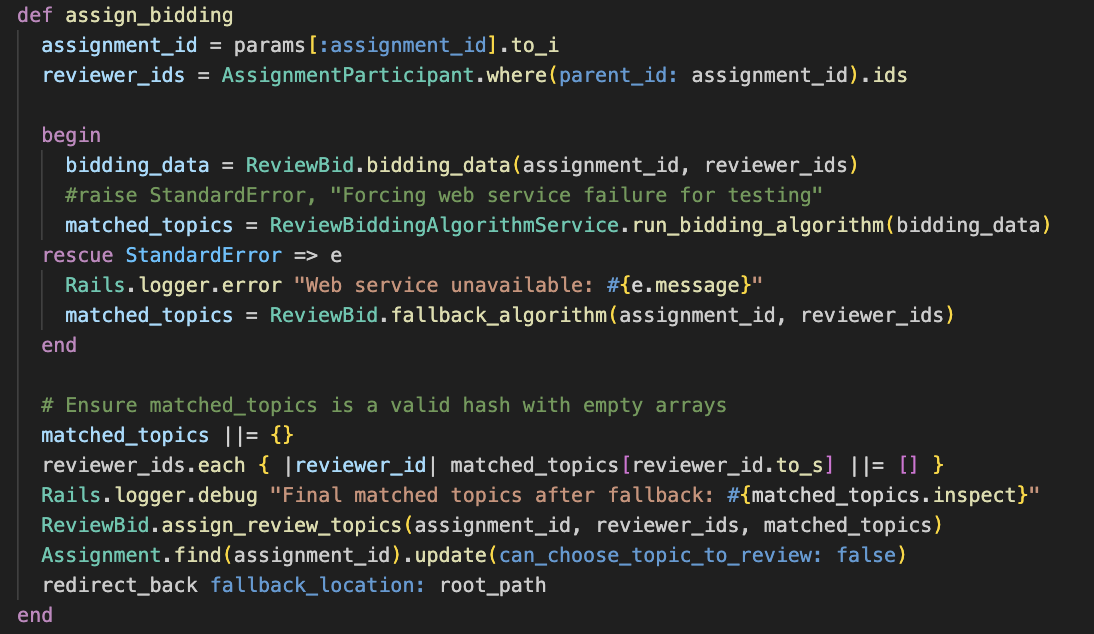User:Akumarm: Difference between revisions
No edit summary |
No edit summary |
||
| Line 1: | Line 1: | ||
== Fallback Algorithm == | == Fallback Algorithm == | ||
=== ''Introduction'' === | === ''Introduction'' === | ||
The Fallback Algorithm in Expertiza is designed to ensure automatic topic assignment when the primary Bidding Algorithm fails due to Web Service unavailability. | The Fallback Algorithm in Expertiza is designed to ensure automatic topic assignment when the primary Bidding Algorithm fails due to Web Service unavailability. | ||
| Line 33: | Line 31: | ||
If the primary bidding service fails, the system catches the error and calls the Fallback Algorithm. | If the primary bidding service fails, the system catches the error and calls the Fallback Algorithm. | ||
[[File:Controller-code.png|700px]] | |||
Key Takeaway: If ''ReviewBiddingAlgorithmService'' fails, the system automatically calls fallback_algorithm. | Key Takeaway: If ''ReviewBiddingAlgorithmService'' fails, the system automatically calls fallback_algorithm. | ||
| Line 67: | Line 38: | ||
This method ensures fair topic assignment when the bidding system fails. | This method ensures fair topic assignment when the bidding system fails. | ||
[[File:Controller-code.png|700px]] | |||
Key Takeaway: This function ensures every reviewer receives a topic without requiring manual intervention. | Key Takeaway: This function ensures every reviewer receives a topic without requiring manual intervention. | ||
| Line 110: | Line 45: | ||
To verify correctness, we use unit tests in ''review_bid_spec.rb'': | To verify correctness, we use unit tests in ''review_bid_spec.rb'': | ||
[[File:Controller-code.png|700px]] | |||
The Fallback Algorithm ensures that ''topics are assigned fairly'' even when the primary bidding service fails. By prioritizing ''larger teams'', ''avoiding self-review'', and using a ''round-robin strategy'', the fallback mechanism keeps the review process smooth and automatic. | The Fallback Algorithm ensures that ''topics are assigned fairly'' even when the primary bidding service fails. By prioritizing ''larger teams'', ''avoiding self-review'', and using a ''round-robin strategy'', the fallback mechanism keeps the review process smooth and automatic. | ||
Revision as of 21:27, 24 March 2025
Fallback Algorithm
Introduction
The Fallback Algorithm in Expertiza is designed to ensure automatic topic assignment when the primary Bidding Algorithm fails due to Web Service unavailability.
Normally, Expertiza allows reviewers to bid on topics, and the ReviewBiddingAlgorithmService processes these bids to assign topics. However, when this web service fails (due to API downtime, server issues, or unexpected errors), the system must switch to fallback and automatically assign topics to reviewers.
Solution
It is triggered when the web service is unavailable. It ensures fair topic assignment by:
- Prioritizing topics with the largest teams.
- Using a round-robin approach to distribute topics among reviewers.
- Ensuring reviewers do not get their own team’s topic.
When is this Used?
- The ReviewBiddingAlgorithmService fails due to an API issue.
- The web service times out or returns an error.
- Unexpected exceptions occur in the bidding process.
Instead of stopping the review process, the system automatically falls-back to an internal algorithm to distribute topics.
How Does the Fallback Algorithm Work?
The algorithm follows these **four main steps:
- Fetch available topics – Retrieves all topics for the given assignment.
- Sort topics by team size – Topics with more members are given priority.
- Create a topic queue – Topics are arranged in descending order of team size.
- Assign topics in a round-robin manner – Reviewers are assigned topics while avoiding their own team's topic.
This ensures fair and balanced distribution of topics.
Implementation - Controller Code (Triggering the Fallback)
If the primary bidding service fails, the system catches the error and calls the Fallback Algorithm.
Key Takeaway: If ReviewBiddingAlgorithmService fails, the system automatically calls fallback_algorithm.
Implementation - Model Code (Fallback Algorithm)
This method ensures fair topic assignment when the bidding system fails.
Key Takeaway: This function ensures every reviewer receives a topic without requiring manual intervention.
RSpec Testing of Fallback Algorithm
To verify correctness, we use unit tests in review_bid_spec.rb:
The Fallback Algorithm ensures that topics are assigned fairly even when the primary bidding service fails. By prioritizing larger teams, avoiding self-review, and using a round-robin strategy, the fallback mechanism keeps the review process smooth and automatic.
